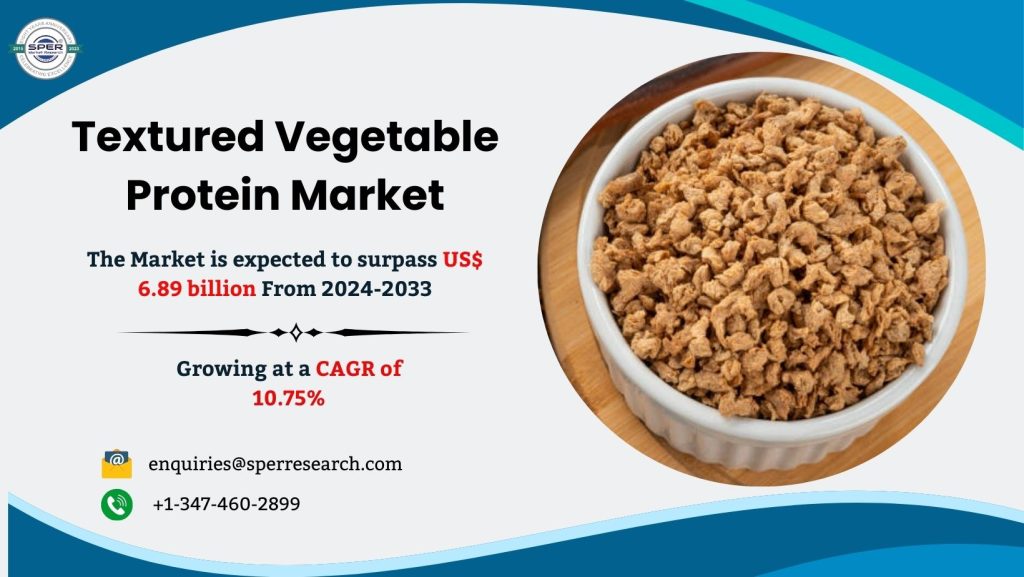Textured Vegetable Protein (TVP) is a high-protein plant-based food product that is mostly made from defatted soy flour; however, it may also be made from other protein sources like wheat or peas. It is a versatile ingredient that may be processed into slices, flakes, chunks, and granules to resemble meat in dishes for vegetarian and vegan diets. TVP is popular in the food industry because of its high protein content, low cost, and ability to absorb flavours. It is commonly used on vegetarian meals including burgers, sausages, and chili. As a shelf-stable, high-protein alternative, TVP encourages dietary choices cantered on sustainability, plant-based nutrition, and less environmental impact.
According to SPER Market Research, ‘Global Textured Vegetable Protein Market Size – By Type, By Nature, By Form, By Application- Regional Outlook, Competitive Strategies and Segment Forecast to 2033’, states that the Global Textured Vegetable Protein Textured Vegetable Protein Market is estimated to reach USD 6.89 billion by 2033 with a CAGR of 10.75%.
Drivers: The textured vegetable protein (TVP) market is being driven by a number of reasons. As consumers search for healthier food alternatives, their rising concern for their health has created demand for plant-based protein replacements. The flexitarian movement and the popularity of vegan and vegetarian diets have increased TVP’s reach because of its meat-like texture and versatility in cooking. Concerns about the environmental effects of meat production and its carbon footprint are driving up consumer demand in sustainable food choices, which makes TVP more appealing. Furthermore, TVP products now appeal to a larger spectrum of customers, including non-vegetarians, because to advancements in food technology, which have improved their flavour and texture.
Download sample PDF copy of this report to understand structure of the complete report @ https://www.sperresearch.com/report-store/textured-vegetable-protein-market.aspx?sample=1
Restraints: The textured vegetable protein (TVP) market is beset by several challenges. One significant issue that might hinder adoption is consumer distrust over the flavour and texture of plant-based proteins compared to traditional meat. Furthermore, even though TVP is an inexpensive alternative, price fluctuations for raw materials, particularly soy and other plant-based sources, may influence production costs and pricing. Concerns with genetically modified organisms and potential allergies, such as soy in TVP products, may deter some buyers. Pea protein and mycoprotein, two other plant-based protein sources, are strong rivals in the market. TVP producers also have difficulties in meeting evolving regulatory requirements while upholding a high standard of quality.
COVID-19 Impact: The COVID-19 pandemic had a significant impact on the texture vegetable protein (TVP) industry. Shortages of labour and disruptions in the supply chain initially affected production and delivery. However, as consumers searched for more sustainable and healthful food options, demand for plant-based proteins surged during lockdowns. TVP’s expanding popularity corresponded with consumer concerns about food security because of its favourable nutritional profile, affordable price, and long shelf life. The popularity of home cooking has led to an expansion in the usage of TVP in various meals. Despite initial challenges, the pandemic generally accelerated the shift to plant-based diets, raising consumer knowledge of and acceptance of TVP.
North America dominates the Textured Vegetable Protein market due to high consumer demand for plant-based protein, a strong presence of key manufacturers, and increasing health consciousness among consumers. Major players in the market are AGT Food & Ingredients Inc., Associated British Foods PLC, Bob’s Red Mill Natural Foods, Bunge Limited, Cargill Inc, Others.
Global Textured Vegetable Protein Market Segmentation:
By Type: Based on the Type, Global Textured Vegetable Protein Market is segmented as; Soy, Wheat, Pea.
By Nature: Based on the Nature, Global Textured Vegetable Protein Market is segmented as; Organic, Inorganic.
By Form: Based on the Form, Global Textured Vegetable Protein Market is segmented as; Chunks, Slice, Flakes, Granules.
By Application: Based on the Application, Global Textured Vegetable Protein Market is segmented as; Meat Alternatives, Snacks Foods, Bakery, Animal Feed.
By Region: This research also includes data for North America, Asia-Pacific, Latin America, Middle East & Africa, and Europe.
For More Information in Textured Vegetable Protein Market, refer to below link –
Textured Vegetable Protein Market Share
Others Industry Report –
- United States Building Automation System Market Growth, Size, Trends Analysis- By Component, By Application, By Communication Technology, By End User- Regional Outlook, Competitive Strategies and Segment Forecast to 2033
- United States Vegetable Seed Market Growth, Size, Trends Analysis- By Breeding Technology, By Cultivation Mechanism, By Crop Family- Regional Outlook, Competitive Strategies and Segment Forecast to 2033
- United States Cafes and Bars Market Growth, Size, Trends Analysis- By Cuisine, By Outlet, By Location- Regional Outlook, Competitive Strategies and Segment Forecast to 2033
- Europe Solar Power Equipment Market Growth, Trends, Analysis, Size- By Equipment, By Application- Regional Outlook, Competitive Strategies and Segment Forecast to 2033
Follow Us –
LinkedIn | Instagram | Facebook | Twitter
Contact Us:
Sara Lopes, Business Consultant – U.S.A.
SPER Market Research
+1-347-460-2899
